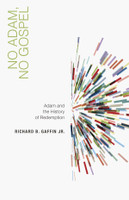
Gaffin, Richard
Description
The scope of Jonathan Edwards’ book, A History of the Work of Redemption, is vast. From a deep extensive knowledge of Scripture, Jonathan Edwards sets out to survey the whole of the redemptive work of God in history, from the Fall of man to the consummation of all things.
A thrilling conclusion emerges: Everything in human history from start to finish is subservient to Christ’s work of redemption. Not only can nothing thwart that work, but, in the wisdom of God, all that comes to pass actually serves to advance it.
In a series of thirty sermons preached in Northampton, New England, in 1739, Edwards sought to establish his congregation in this mighty truth. Later in his ministry he hoped to write a book expounding the same theme, and was even reluctant to accept the presidency of Princeton College for fear this project would be hindered.
Although he did not live to carry out his intention, we can see the substance of what the intended book would have contained in this new edition of the sermons of 1739. Here readers can catch Edward’s vision of the mighty advance of the cause of Christ in the world, and gain encouragement for all gospel labours from the certainty of its triumph.
Contents
Period 1: From the Fall of Man to the Incarnation of Christ
1. From the Fall to the Flood
2. From the Flood to the Calling of Abraham
3. From the Calling of Abraham to Moses
4. From Moses to David
5. From David to the Babylonish Captivity
6. From the Babylonish Captivity to the Coming of Christ Improvement
Period 2: From the Incarnation of Christ to His Resurrection
1. Christ’s Incarnation
2. Christ’s Purchase of Redemption
Period 3: From the Resurrection of Christ to the End of the World
1. Christ’s Resurrection and Ascension
2. Christ’s Accomplishment in Grace and Glory
About the Author
Jonathan Edwards (1703–1758) served the Northampton Congregational Church in Massachusetts for twenty-three years, then missionary outpost to the Mohawk and Mohican tribes. In 1758, he became president of the College of New Jersey (now Princeton University). Edwards "is widely acknowledged to be America's most important and original philosophical theologian," and one of America's greatest intellectuals.